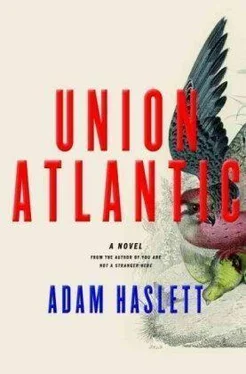“We’re the victims of our success,” he said to Doug, once Sabrina had got him on the line. “Half of Greenwich wants to give me their money. If we don’t lend them the margin, someone else will.”
He sounded jacked up, teetering on nervous, which was just where Doug wanted him, on that vigilant edge, pumped about what he had in hand but wanting more. When news of what the Japanese Ministry of Finance was doing to prop up the Nikkei became public, he could turn McTeague off. But at present he was working perfectly.
“Three hundred and twenty million. That’s a lot of money,” Doug said. “Keep me close, you understand? I want to see the daily numbers.”
“Of course,” McTeague replied.
“You know Holland’s waiting for you, right?” Sabrina said, ignoring the fact that he was on the phone as she sat sprawled on the couch, leafing through a magazine. “He called down here himself.”
THE ARCHITECTS of the Union Atlantic tower had understood well who their client was. Not a corporation, not a board of directors, and certainly not a twelve-member building committee, but one man, the head of all three: Jeffrey Holland. The new headquarters had been his project from the outset and no major decision regarding it had been made without his approval. In the chairman’s suite, a brocade upholstered sofa fit for an English country manor sat beneath a painting of a river valley and snowcapped mountains, the canvas framed in faded gold leaf. The sofa afforded a view, through floor-to-ceiling windows, onto a flagstone terrace beyond the railing of which was visible only sky. This office — really its own structure sitting atop the tower — had everything an acquisitive soul might want of architecture without the distraction of postmodernism or the discomfiture of real innovation. The gesture toward minimalism in its frame and fenestration was sufficient to give it the patina of restraint, while in every significant detail, from the fluted columns of the dark-wood bookcases to the enormous Oriental carpets, it retained all the pleasures of empire. It was a big, bright compliment of a room.
Which, of course, fit well its function. When you wanted a French media-and-defense conglomerate to do its banking with you rather than with Chase, this was a fine place to chat with their chairman about his country house, his daughter’s art-school plans, and the benefits of proximity to Harvard before the lesser suits took him downstairs to explain the offer. You didn’t do PowerPoint in a room like this; you put people at ease.
“He’s on the phone,” Holland’s secretary, Martha, said, as Doug approached. “Not that that will stop you.”
He continued up the hall to the open door of the sun-flooded office. The man himself stood by the far window with his back to Doug looking north over the Fleet Center to the webbed white cables of the new Zakim bridge that spanned the mouth of the Charles. He spoke to the view, his hands in his pockets, the silver dagger of an earpiece extending an inch down his cheek.
“…. which is why those aren’t the only provisions we want in the bill. Everyone has an interest in transparency: us, the consumer, the courts. Who doesn’t want bankruptcies sped up? Who doesn’t want them rationalized? And I don’t think anyone’s been better at communicating that than you, Senator.”
He shook his head back and forth in disagreement with whatever he was hearing on the other end. When he turned and spotted Doug, he gestured with a nod for him to sit.
“Of course, Senator, I understand that, and believe me the last thing I want is my own lobbyist getting in the way of … I understand that.”
Holland was a tall man, six-three at least, broad shouldered and bulky in the chest without quite being overweight. He’d never been an athlete in college, yet he had an athlete’s bodily ease, his big shoulders rolled back, his girth part of the motion of his walk as he approached you, more an element of persuasion than anything to be embarrassed by. That same animal confidence was part of the motion of his face with its wide, agile mouth, full cheeks and thick nose, and the soft blue eyes, such an intimate part of the larger seduction. Photographs captured only the bluntness and gave little hint of the effect his physical presence had on others. Doug had seen it a hundred times, the way he rolled in on a mark — client or politician or friend — leveling their defenses at the outset with the big handshake, the big knowing smile, the slightly colder stare pushing the last barrier aside, so that by the time he opened his mouth his target was already nodding in agreement.
“Well,” Holland said with a chuckle, “if Bob Rubin can call himself a Democrat, I guess I can too. And believe me, we’re talking to your colleagues. No reason this should be a party-line matter. The public needs to hear about the safeguards, see how it would make credit cheaper for everyone in the end. We’re ready to roll all that out. It’s just a matter of timing, which is why I wanted to get your sense of where things stand … Of course, of course, we’ll be in touch.”
He removed his earpiece, took a seat, and swung his feet up onto the desk.
“Grassley’s an asshole.”
“He’s still with us, right?”
“Sure he is. The bankruptcy bill’s been his for years. Trouble is, if it ever gets passed he’ll need a whole new fund-raising strategy.” He joined his hands behind his head and stretched out to full length. “But that’s not my main concern right now. Have you looked at your cash position lately? You’ve got us lending to your traders hand over fist. Don’t get me wrong — your profits are impressive. But you’re tying up a lot of capital.”
He stood, thrust his hands in his pockets, and began pacing behind his desk.
“We’re attracting clients,” Doug said. “And we’re lending them the money to play the market with. It’s not our risk, it’s theirs. That’s the bigger point. The business is growing.”
I understand the position you’re in. That’s what Doug had told Holland during his final interview for the job. The board wants results. They want them quickly. What didn’t need to be said, what Doug’s tone of absolute confidence had said for itself: There will be times when it would be better if you didn’t know everything. I understand that too.
Holland had no idea how he and McTeague had discovered the plans of the Japanese government nor had he briefed him on the finer details of the Finden Holdings arrangement.
Coming up in the industry, Doug had met a lot of guys like Holland, men in their fifties and sixties who had never been in the military. Like the rest of them, Holland loved that Doug had run air defense on the most advanced ship in the navy and that he’d seen action in the Persian Gulf. He derived pleasure from it, the same satisfaction, it struck Doug, as the pleasure he himself used to get inspecting missiles down in their bays, running his hand over the shiny white warhead of an SM-2, feeling through the tips of his fingers all that locked-down, riveted potential. That’s what he was for a man like Holland: an attractive weapon. Doug worked best with the men who understood implicitly the balance of excitement, ignorance, and reward he offered. And no one had understood it better than Holland. He knew his aggression had to be channeled through others. He needed tentacles up into the board, laterally into the senior management with eyes on his job, and down into the bowels of the operation, where the consequences of loyalty were more concrete. Like a ship’s captain, who in principle relied on the chain of command but in practice drew close those he trusted, Holland surrounded himself with people who owed their jobs to him, and it was through these officers, of whatever rank, that he worked his will. He loved that all the secretaries had crushes on Doug, and that the rest of the department heads loathed him. Deep into the bullshit of management science, Holland had consultants threaded everywhere, hard at work rubber-stamping his plans, providing cover for whenever an initiative failed. But at base such caution bored him, and if he were honest with himself he would have to admit that it embarrassed him too. To all such mealymouthed, process nonsense, Doug was the perfect antidote: a means to direct action. Yet, as with any secret weapon, the pleasure and protection lay in the having of it, not in the use.
Читать дальше












